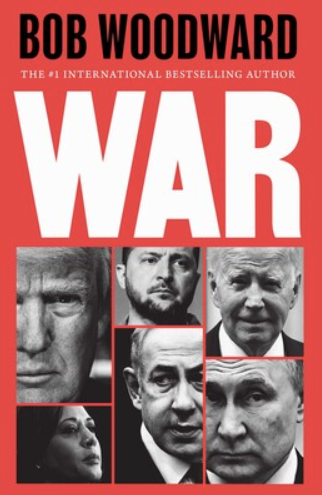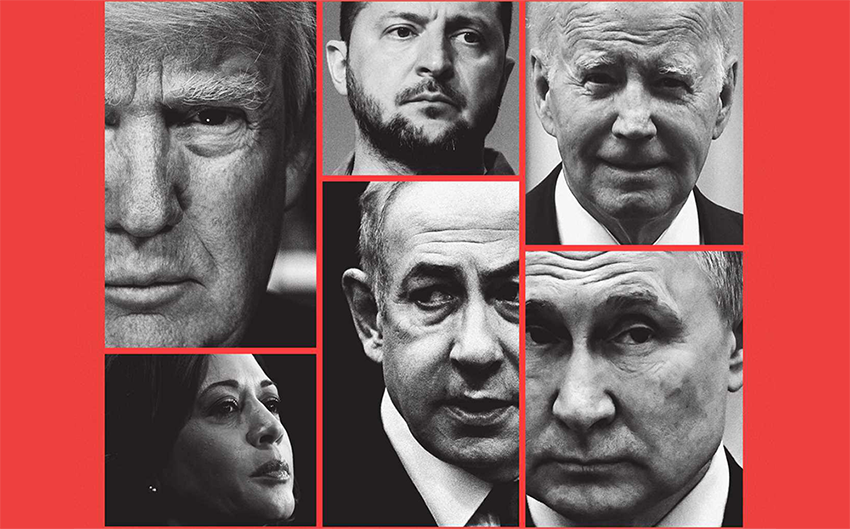Review: War, Bob Woodward, Simon & Schuster
The latest book from veteran reporter Bob Woodward is largely about Joe Biden dealing with war on multiple fronts, in Ukraine and Gaza, without, ironically, the US actually being at war and without US troops on the ground. It’s about Biden’s ‘tightrope’ walk to prevent World War III breaking out. But it’s also about the US’s virtual civil war, a domestic cold war. So let’s start with Trump…
Trump kept banging on about the 2020 election being stolen, despite advice from allies to desist and no evidence of fraud. Six months after, he was still expecting Republicans (somehow) to overturn the election result. Even in private, where he can be more measured, Trump ranted that the election was stolen, suggesting he wasn’t just saying it publicly to save face, but that he really believed it, as much as he believes anything. Or rather, it’s as if he believed him saying it made it true – a psychopathic trait perhaps.
American military leaders have lined up to outline the threat to American democracy and international stability from a second Trump presidency, with one describing Trump as a ‘total fascist’, partly due to Trump as president fuming that the military wouldn’t act domestically against protestors. Woodward, echoing military leaders, describes Trump as the ‘most reckless’ president in US history.
Another military leader suggested to Woodward that had the Ukraine invasion happened on Trump’s watch, Trump would have just let Putin walk into Kyiv. Even Trump’s advisors can’t get a handle on Trump’s relationship with Putin. I have wondered, as one advisor does, if Putin has some dirt on Trump, but it seems Trump takes to dictators. He admires Putin’s ruthlessness and control of the story in Russia. On the other side, Putin is a master manipulator who flatters Trump and uses him for his own ends.

One of the revelations in Woodward’s book is that Trump sent Covid testing machines to Putin, who, understanding Trump’s situation better than Trump, counselled Trump not to tell anyone. Trump has denied such allegations, and there have always been suggestions that some of the dialogue in Woodward’s books is akin to ‘as imagined by Bob Woodward’, but Trump is now like the boy who cried wolf, pumping out lies on an industrial scale such that his protestations are as good as meaningless.
Trump says he learned from watching Jack Nicklaus play golf to bide one’s time and let the other guy falter. After his election, Biden was clearly trying to move beyond Trump’s lies and bungling, not even mentioning Trump by name, but there remained a large contingent of Americans who were not interested in Biden’s achievements, and who rather wanted someone to blame, who latched onto conspiracy theories and the demonstrably false rhetoric of Trump.
Until he faltered on the domestic stage in the first debate, Biden had plenty of opportunity to falter internationally, for Trump to build on. When Putin moved into Ukraine, Biden thought, now this?!
Putin’s fear of Covid meant he had years of isolation with an inner circle that fed his nationalistic and unfounded theories – somewhat like Trump. (One Republican said the ‘bubble’ of Mar-a-Lago was a ‘culture’ similar to North Korea’s.) This unwavering worldview of Putin’s held Putin as an historically great Russian leader who would prove it by bringing Ukraine under the control of the Russian ‘empire’. Like other dictators, this vision of himself is at the expense of the Russian people.
Boris Johnson had called Putin ‘creepy’. When the US were convinced Russia would invade Ukraine, Biden called Putin, who exhibited a cold, ‘matter-of-fact’ tone, that of someone without a soul, as Biden says he told Putin directly. Woodward’s account is of how to negotiate with such an icy ideologue, of knowing whether to bluff or threaten, when to be secretive, what one is prepared to lose, what price peace.
Worryingly, Putin was toying with the idea of using a ‘tactical’ nuclear weapon in Ukraine, and using a pretext such as that Ukraine was planning to build a ‘dirty’ bomb. The US roped in Putin’s allies including China to warn Putin off such a nightmare scenario. It remains an option though and becomes more real when Russia continues to lose the war and Putin becomes more desperate. Part of Biden’s concern was to hold off Putin without backing him into a corner where Putin would want to use nuclear weapons. Woodward’s assessment is that Biden did an extraordinarily good job in the circumstances.
Then, on top of that and the background of an aggressive China, Gaza happened – the sickening October 7 attacks on Israelis, and the sickening humanitarian crisis of Netanyahu’s all-in demolition of Gaza.
There is much detail in Woodward’s book about the Middle East negotiations. The Arab states were prepared to help get rid of Hamas, seeing the group as trouble, but only if Israel showed restraint, something Netanyahu was reluctant to do. Woodward describes Netanyahu as a natural war leader who wanted to push the whole Gaza population into Egypt and who wanted to control the territory. His military leaders described the Palestinians simply as ‘animals’. In response, Biden said to Netanyahu, ‘You’ve got no strategy’. An increasingly frustrated Biden cursed Netanyahu in private as a liar.

Trump, claims of course, that he will fix it all, but there are warning signs that a Trump re-election may hurt Ukraine as well as the likes of Taiwan. Trump is harder to read on Israel. His administration did make some inroads to Middle East peace, but Trump’s underlying attitude is to prioritise his own prosperity, and his recklessness means that internationally he is as dangerous as he is domestically.
Nick Mattiske blogs on books at coburgreviewofbooks.wordpress.com and is the illustrator of Thoughts That Feel So Big.












